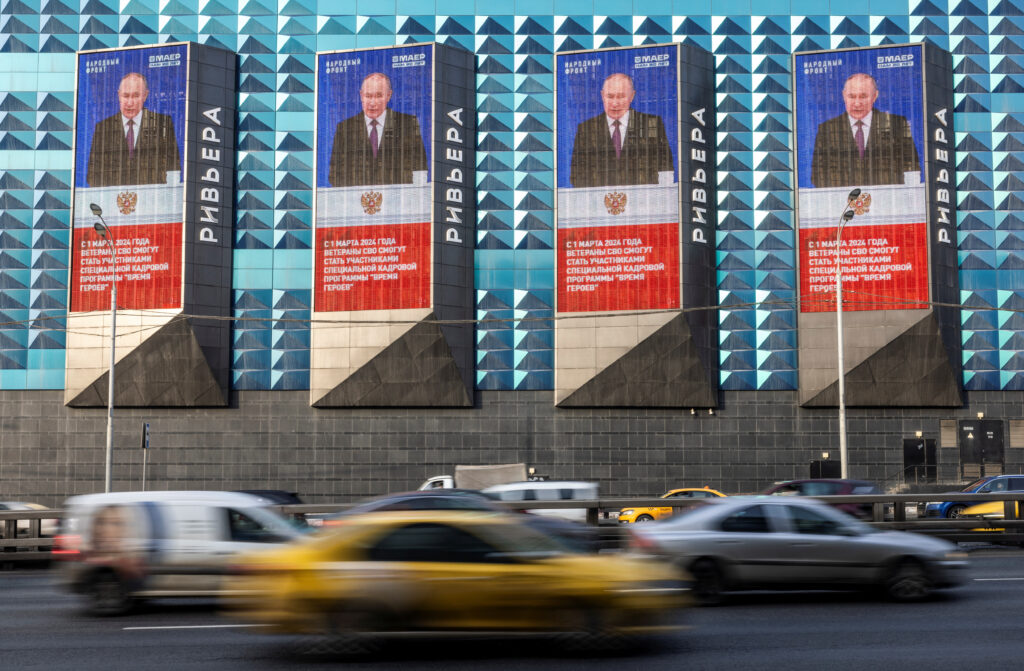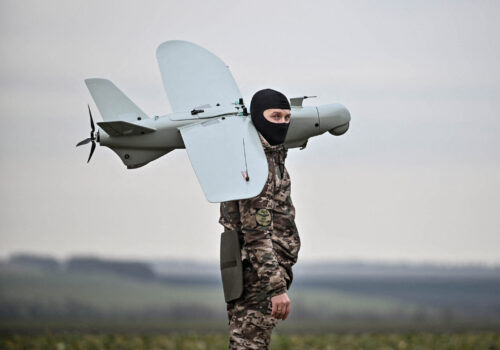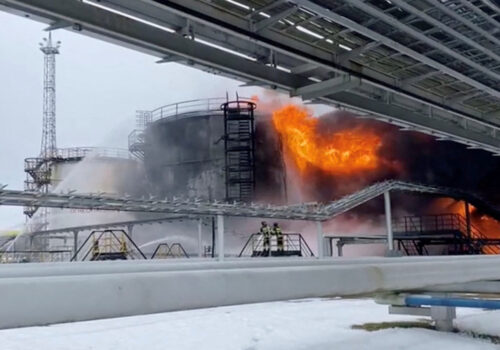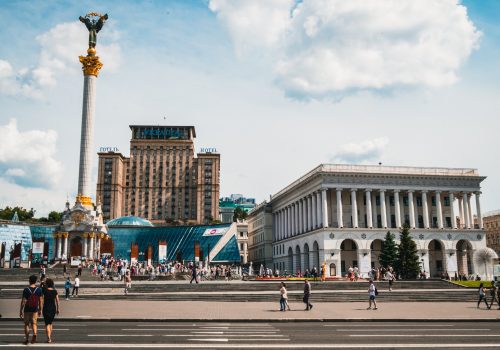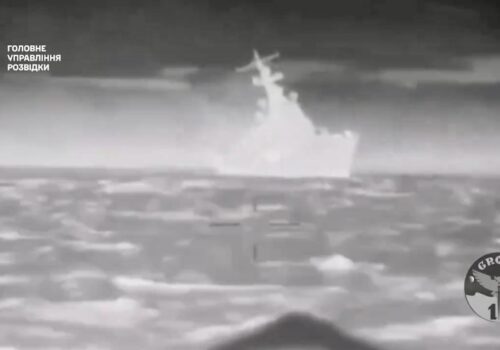
Bowing to Putin’s nuclear blackmail will make nuclear war more likely
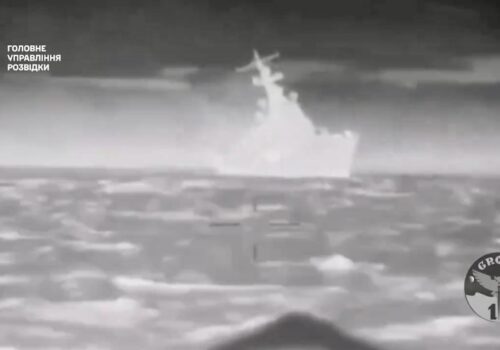
Russia could respond with nuclear weapons if the West sends troops to Ukraine, Vladimir Putin has warned. In his annual State of the Nation address on February 29, the Russian dictator said any attempt to deploy Western troops in Ukraine “threatens a conflict with nuclear weapons and the destruction of civilization.”
This was the latest and most explicit in a series of nuclear threats made by Putin since he first ordered the full-scale invasion of Ukraine just over two years ago. When announcing the invasion, Putin warned against any Western intervention with promises of consequences “such as you have never seen in your entire history.” Four days later, he ordered Russia’s nuclear forces to be put on high alert.
Following Russia’s defeat in the March 2022 Battle of Kyiv, Putin sought to deter the West from arming Ukraine by promising a “lightning-fast” response and strongly hinting that he was ready to use nuclear weapons. “We have all the tools for this that no one else can boast of having,” he declared. “We won’t boast about it: We will use them if needed and I want everyone to know that. We have already taken all the decisions on this.”
Prior to this week’s statement, Putin’s most notorious nuclear threats came during a televised September 2022 address to announce Russia’s first mobilization since World War II. With the Russian army retreating in disarray in Ukraine, Putin referenced his country’s nuclear arsenal and vowed to use “all means at our disposal” to defend Russia. “This is not a bluff,” he declared.
Stay updated
As the world watches the Russian invasion of Ukraine unfold, UkraineAlert delivers the best Atlantic Council expert insight and analysis on Ukraine twice a week directly to your inbox.
Ukraine has repeatedly called Putin’s bluff, exposing the emptiness of the Russian dictator’s nuclear bluster. Just weeks after his September 2022 speech, the Ukrainian military liberated Kherson, the only regional capital captured by Russia since the start of the invasion and a city that Putin himself had just trumpeted as “forever Russian.” Rather than reaching for the nuclear button, Putin reacted to this embarrassing defeat by ordering his troops to quietly withdraw.
Russia has responded in similar fashion to setbacks in the Battle of the Black Sea. Kremlin officials have long sought to position Crimea as a red line for Russia, but this has not prevented Ukraine from damaging or sinking approximately one-third of the Russian Black Sea Fleet. This humiliation has not provoked a nuclear response from Putin. Instead, the bulk of his fleet has retreated from its traditional home port in occupied Crimea to the safety of Russia.
While Ukraine has refused to be intimidated by Putin’s nuclear blackmail, the same cannot be said for the West. Putin’s thinly veiled threats may appear crude and primitive, but there can be little doubt that they have been instrumental in fueling the crippling fear of escalation that has plagued Western decision-making ever since the first days of the invasion. This has led to the disastrously slow delivery of military aid to Ukraine and the outright denial of weapons systems that could have set the stage for a Ukrainian victory.
Ukrainian President Volodymyr Zelenskyy has identified this Western fear of escalation as the single biggest obstacle to his country’s war effort. “Nothing has harmed our coalition more than this concept,” he commented in January 2024.
Eurasia Center events

Unless this changes, the damage will not be limited to Ukraine. If the mere suggestion of a possible nuclear escalation is enough to deter the West from preventing Russia’s takeover of Ukraine, Putin will inevitably employ the same tactics against other countries. He is already openly portraying the current invasion as a sacred mission to reclaim “historically Russian lands.” With more than a dozen other countries also potentially qualifying as “historically Russian,” it is all too easy to image further invasions in the coming years accompanied by more of Putin’s thinly veiled nuclear threats.
Nor will the implications be restricted to Russia’s wars of aggression. On the contrary, fellow autocrats around the world will take note of Putin’s success in Ukraine and draw the logical conclusions for their own expansionist agendas. If nuclear intimidation works for Moscow, why not for Beijing or Pyongyang?
This has the potential to spark a dangerous arms race. If Russia manages to normalize nuclear intimidation as a foreign policy tool, numerous countries will soon be scrambling to acquire nuclear arsenals of their own. There are indications that this issue is already being discussed in some quarters. Speaking in February 2024, Polish Foreign Minister Radoslaw Sikorski warned that if additional US support for Ukraine is not forthcoming, “some countries will start hedging, and others will be considering developing their own nuclear weapons programs.”
By allowing themselves to be intimidated by Putin’s nuclear threats, Western leaders risk plunging the whole world into a dark new era of insecurity and aggression. Russia’s successful use of nuclear blackmail in Ukraine will transform attitudes toward nuclear weapons and undermine decades of nonproliferation efforts. Nukes will become an essential tool for any country that wishes to avoid being bullied by their neighbors. The potential for nuclear war will increase dramatically, as will the possibility of stray nukes falling into the hands of non-state actors.
Vladimir Putin’s decision to use nuclear intimidation as part of his Ukraine invasion is a reckless gamble that reflects his firm belief in Western weakness. Unless the West proves him wrong, the consequences for global security will be catastrophic.
Peter Dickinson is editor of the Atlantic Council’s UkraineAlert service.
Further reading
The views expressed in UkraineAlert are solely those of the authors and do not necessarily reflect the views of the Atlantic Council, its staff, or its supporters.

The Eurasia Center’s mission is to enhance transatlantic cooperation in promoting stability, democratic values and prosperity in Eurasia, from Eastern Europe and Turkey in the West to the Caucasus, Russia and Central Asia in the East.
Follow us on social media
and support our work
Image: Cars drive past electronic screens on the facade of a building showing an image of Russian President Vladimir Putin and a quote from his address to the Federal Assembly, in Moscow, Russia. February 29, 2024. (REUTERS/Maxim Shemetov)
